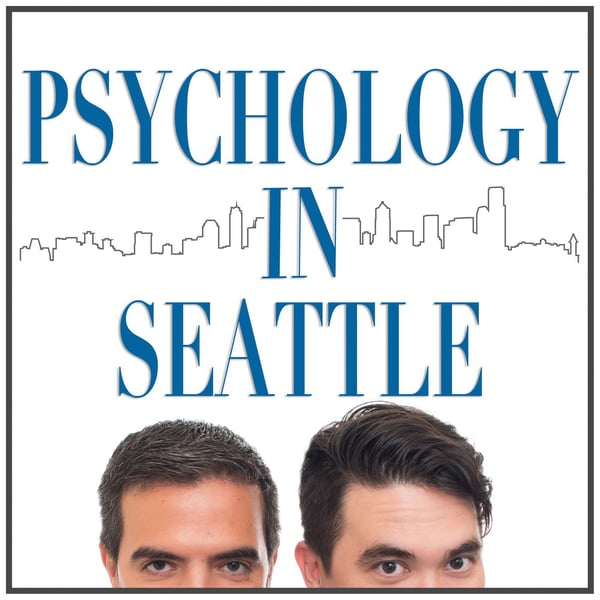Trauma Bonding, Differentiation, and Other Topics
Psychology In Seattle Podcast
Kirk Honda
4.6 • 1.2K Ratings
🗓️ 20 August 2021
⏱️ 74 minutes
🧾️ Download transcript
Summary
Become a patron: https://www.patreon.com/PsychologyInSeattle
Email: https://www.psychologyinseattle.com/contact
Get merch: https://teespring.com/stores/psychology-in-seattle
Dr. Kirk’s Cameo: https://www.cameo.com/kirkhonda
Instagram: https://www.instagram.com/psychologyinseattle/
Discord: https://discord.gg/6QR4sE8x9K
Reddit: https://www.reddit.com/r/PsychologyInSeattle/
Twitter: https://twitter.com/PsychInSeattle
Facebook Official Page: https://www.facebook.com/PsychologyInSeattle/
Facebook Fan Page (run by fans): https://www.facebook.com/groups/112633189213033
The Psychology In Seattle Podcast ®
Trigger Warning: This episode may include topics such as assault, trauma, and discrimination. If necessary, listeners are encouraged to refrain from listening and care for their safety and well-being.
Disclaimer: The content provided is for educational, informational, and entertainment purposes only. Nothing here constitutes personal or professional consultation, therapy, diagnosis, or creates a counselor-client relationship. Topics discussed may generate differing points of view. If you participate (by being a guest, submitting a question, or commenting) you must do so with the knowledge that we cannot control reactions or responses from others, which may not agree with you or feel unfair. Your participation on this site is at your own risk, accepting full responsibility for any liability or harm that may result. Anything you write here may be used for discussion or endorsement of the podcast. Opinions and views expressed by the host and guest hosts are personal views. Although, we take precautions and fact check, they should not be considered facts and the opinions may change. Opinions posted by participants (such as comments) are not those of the hosts. Readers should not rely on any information found here and should perform due diligence before taking any action. For a more extensive description of factors for you to consider, please see www.psychologyinseattle.com
This show is part of the Spreaker Prime Network, if you are interested in advertising on this podcast, contact us at https://www.spreaker.com/show/3269717/advertisement
Transcript
Click on a timestamp to play from that location
| 0:00.0 | Hey, deserving listeners. I thought I would answer some patron emails. This first emails from |
| 0:04.5 | anonymous upper tier patron, they write, can you please talk about trauma bonding? I've recently |
| 0:10.9 | heard a few influential people on YouTube using the term trauma bonding in an incorrect manner. |
| 0:17.2 | They all use it in the context of bonding with someone that has been through similar |
| 0:22.0 | traumatic experiences, end of email. Right. So the term trauma bonding is related to abuse, |
| 0:31.9 | when you bond with your abuser. And I can see why people would misuse it or even just invent a |
| 0:39.2 | new term. Not a lot of people even in intimate partner violence circles necessarily use the term |
| 0:45.7 | trauma bonding very often. So it's either that they are misunderstanding the term or they've just |
| 0:52.5 | invented a new phrase. And it just coincides with a term in intimate partner violence or in |
| 1:01.1 | abuse circles. So other terms that people will abuse, like when they say codependency, that will |
| 1:09.1 | bother me, because that's clearly not something that they came up on their own. But it's possible |
| 1:13.9 | that people just came up with trauma bonding on their own and they're using it to refer to, |
| 1:18.1 | as you say, bonding over going through similar traumas. And I don't know if that really bothers me |
| 1:23.8 | that much in my pedanticness. But yeah, let's talk about trauma bonding. So like I said, |
| 1:29.4 | it's when victims bond with the perpetrator essentially. It's like Stockholm syndrome. |
| 1:34.3 | There are a lot of relationships types that this will be applied to in the literature, |
| 1:38.0 | obviously in a partner violence, domestic violence, relationships, romantic relationships. |
| 1:42.5 | But also cults or hostage situations at work with an abuse of boss, sex trafficking, |
| 1:49.4 | you know, pimp sort of situations and even a parent child relationship. It's a part of the |
| 1:54.6 | abuse cycle. When the abuse happens, there's usually a cycle that will, you know, the pendulum will |
| 2:01.3 | swing from abuse to reward to abuse to reward. And often it's done in an unpredictable manner by |
| 2:07.7 | the abuser. And this can cause the victim to feel like they're always walking on eggshells |
... |
Please login to see the full transcript.
Disclaimer: The podcast and artwork embedded on this page are from Kirk Honda, and are the property of its owner and not affiliated with or endorsed by Tapesearch.
Generated transcripts are the property of Kirk Honda and are distributed freely under the Fair Use doctrine. Transcripts generated by Tapesearch are not guaranteed to be accurate.
Copyright © Tapesearch 2025.

